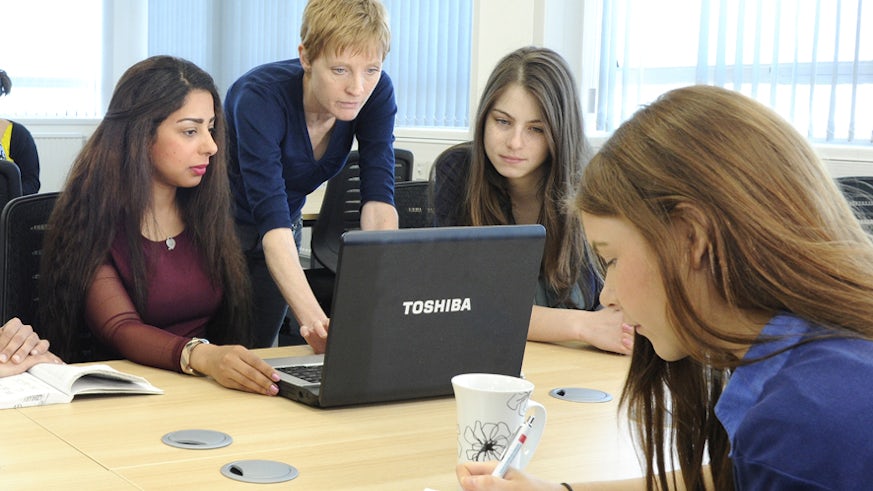Healthcare Sciences launches Impact and Engagement seminar series
22 Mai 2015

Involving service users as co-designers of improved services and new medical technologies can lead to valuable innovations. Recent innovations have received increasing recognition because of their applicability and contribution to improved patient experience. Researchers with expertise in serviceuser involvement in palliative care, mental health and physiotherapy presented their experiences and research findings at the School of Healthcare Sciences’ first Impact and Engagement seminar on the 21st of May.
Dr Patricia Grocott (Reader in Palliative Wound Care, King’s College London, Florence Nightingale Faculty of Nursing and Midwifery,) has used these techniques over the last decade to improve wound care for people suffering from the genetic condition Epidermolysis Bullosa. In 2013 King’s won the outstanding impact research award at the Guardian University Awards for the Woundcare for Epidermolysis Bullosa (WEB) project, which she led. She presented the WEB project and demonstrated the progression form WEB to current work undertaken in collaboration with Dr Turgut Meydan (Reader in Electrical and Electronic Engineering, School of Engineering, Cardiff University) including the GLOVE (Generation and Evaluation of Hand Therapy Devices for Epidermolysis Bullosa) project. Together with users, clinicians, industry collaborators, they are developing a wound dressing glove and a 'splint glove', incorporating computer-knitted textiles with an engineered system of adjustable splints and electronic sensors. The splint glove will supersede the rather limited splint devices in current use. The Wolfson Centre for Magnetics (Cardiff University) is developing the sensor and actuation technologies for the glove to enable controlled splint action to supporting the hand.
Bethan Edwards (Service User Project Assistant) and Dr Ben Hannigan (Reader in Mental Health Nursing in the School of Healthcare Sciences, Cardiff University) presented their experiences of engaging service users as researchers in a research programme that aims to identify and describe factors associated with personalised, recovery-focused and collaborative care planning and care coordination in community mental health services. COCAPP included the development of initial ideas with members of City University London’s SUGAR group. Once funded, a project-specific Lived Experiences Advisory Group chaired by independent service user consultant Alison Faulkner was established. This has contributed to all aspects of the project . People with lived experience were also directly employed as members of the research team and as generators of qualitative interview data. In their presentation Bethan and Ben discussed the organisational challenges faced and met, including those relating to recruitment, governance and payments and talked about preparations for (and the practice of) fieldwork.
Dr Mohammad Al-Amri (Research Associate, School of Healthcare Sciences) discussed the relevance of end-user involvement in the development process of a virtual rehabilitation system for children with cerebral palsy. He presented how he developed, designed, and investigated the practicality of a virtual rehabilitation system suitable for routine clinical use in gait re-education for children with cerebral palsy and other clinical conditions such stroke. The practicality evaluation approach has directed at: satisfaction (how enjoyable is it to use the system); comfort (how easy is it for users to complete tasks, once they have learned the system); safety (how safe is it to use the equipment and what are side effects of using the system); and to some extent utility (to what extent the selected scenarios will benefit the rehabilitation of children with CP effectively).
Mrs
Dawn Pickering (Senior
Lecturer in Physiotherapy, School of Healthcare Sciences) and Karen
Visser (Lecturer in Physiotherapy, School of Healthcare Sciences)
discussed how they enabled the participation of children and young people with
cerebral palsy in adapted cycling research. Parents helped them develop
information sheets for the Pedal Power study which looked into enabling dynamic
adaptive cycling for children and young people with cerebral palsy. They
concluded their presentation with a video
where a young girl with cerebral palsy discussed her experiences of striving to
achieve her goalsThe seminar was concluded with a research
masterclass with Dr Grocott on turning clinical observations of problems in patient care into research
projects that eventually contribute to
the observed problems' solution. Trisha’s
relevant clinical was in hospice based palliative care. She observed patients
and families experiences of living with advanced wounds and experienced the
frustrations of not being able to care for the patients and maintain their
dignity, because the wound dressing products were inadequate. She left the
hospice and applied to King’s College London to study for the degrees required
to be an independent researcher.
The seminar was designed to generate new ideas and inspire attendees to consider increasing impact and engagement in research. Attendees were encouraged to look at the wider picture, learn how patients/members of the public can be included as members of a research team in different ways (particularly during project design and data generation) and provided with ideas about patients collecting data and being more active in the research process.